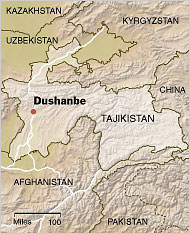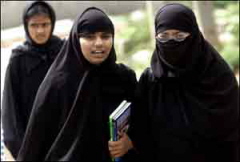November 13, 2006, - 4:15 pm
Want an Extra Wife?: Islamo-Polygamy is What’s for Breakfast in Tajikistan
By Debbie Schlussel
It’s been a crazy day, filled with e-mail and computer glitches. Thus, the absence. My apologies, loyal readers. Believe me, I hate staying away.
Still, had to note this funny and sad piece from today’s New York Times on what happens under Islamofascist statism a/k/a a Muslim caliphate. The title, “After a Century, Public Polygamy is Re-Emerging in Tajikistan,” says it all. The funniest and saddest part is how some Muslim feminists (isn’t that an oxymoron?) don’t mind being part of a menage a multiple wives.
A few scintillating excerpts of what you might be surprised to note is already going on in America (though not as openly, and we’re not talking the Mormons, here, either):


DUSHANBE, Tajikistan, Nov. 7 – Gulya Ismoilova cannot say exactly when men in Tajikistan broke with a century of tradition and began taking second and even third wives, but she remembers precisely when her husband announced he had married again.
A lack of men in Dushanbe and all of Tajikistan has led to polygamy.
“Two years ago he took a woman to his brother’s house,” said Ms. Ismoilova, her hand trembling as she lifted a cigarette to her lips. “That’s when my life ended, when I became a first wife.”
Ms. Ismoilova said she could not have imagined her present circumstances when she married 11 years ago.
Polygamy existed in this overwhelmingly Muslim and rural country in the 70 years when the Soviet Union enforced a fiercely secular governing ideology that continues to be the law of the land. But it was very rare, and occurred in secret arrangements by people living shadowy lives. . . .
[M]en have begun to practice polygamy openly, citing Islamic law and the desire among women for partners to justify the illegal practice. Tajiks say polygamous marriages can now be found in nearly every apartment block in Dushanbe, and few Tajik families seem to be without a recent example.
“These girls require a husband or their families are shamed,” said Ali Fidhoum, 37, an engineer here. “Our religion allows it as long as I have a job and I treat both my wives equally. My second wife’s family is thankful for me, and they should be.”
But not all wives are as grateful as Mr. Fidhoum supposes. Ms. Ismoilova said her husband’s second household had left her humiliated and impoverished, and undermined her authority over her children.
“He tries to get our kids to move to his new wife’s apartment because she can’t have babies,” Ms. Ismoilova said. “These are my children he wants to take away from me. And I can do nothing. First my husband said I can’t work. Now he won’t let me leave the house without his permission.” She spoke slowly, her face distorted with anger. . . .
“I am a slave,” she said. “And now this society accepts it.”
Even those men who disapprove of polygamy say they understand why it has re-emerged. “I wouldn’t consider it,” said Zafer Mahmoudov, 24, a professional. “But for many men here, they are in arranged marriages with girls coming from villages. They have nothing to say to them. These girls do not know how to behave in the city. So they don’t tell their wives, but they go and marry a second one. They just do it and eventually everybody knows.”
The revival in Tajikistan of polygamy – which has been outlawed by the government but is supported by many imams – underscores a surprisingly swift return to traditional cultural and religious practices in all the former Soviet republics of Central Asia. . . .
Ibodat Yatimova, 25, was 14 when her parents placed her in an arranged marriage. Her husband divorced her after five years, forcing her and her two children to move to her parents’ home. To ease the financial burden on her parents, Ms. Yatimova accepted the proposal last year of a 45-year-old laborer who worked in the office where Ms. Yatimova is a secretary.
But there was a catch. “I didn’t know he already had a wife,” Ms. Yatimova said.
She said she was resigned to the arrangement, at least for now.
“It’s important that I show my parents that I have a husband,” she said. “He pays the rent for my apartment. My children show him respect but he doesn’t help them. He has his own children. We don’t really matter to him. When he buys me an apartment, I will leave him. Let him go to his first wife.”
Miriam Cooke, a professor of Arab culture at Duke University . . . she warns against treating it as a black-and-white issue.
Not black-and-white?! Would you say that about the Mormons? Not How Predictable. Bend over for Islam.
“It is complicated,” Ms. Cooke said. “There are some women who consider themselves to be feminists who think it’s perfectly acceptable to be a second or third wife and to be a professional woman, a good Muslim and to have all her rights. . . .”
Complicated?! Feminists?! Un-fricking-believable. We wonder whether Cooke, herself, is married and, if so, whether she’d allow her hubby to have a couple more wives or more. Doubtful. But for Islam, everything’s okay. Incredibly, some Tajikistani women are more enlightened and clueful than this American professoratrix of Islamofascist Apologism.
Rokhshona Nazhmidinova, 26, an outreach coordinator at a nonprofit organization [in Tajikistan says] “It’s a sign that society is heading down. Just look at the countries that allow multiple wives. I wouldn’t want to live in them.”
“Borat“/Sacha Baron Cohen should have parodies Tajikistan, not America. There’s lots of rich material here, without the need to dupe and trick people into it.
The location is Tajikistan, but that is irrelevant. What’s relevant is the governing religion, the “Religion of Peace.”
Tags: Ali Fidhoum, America, Central Asia, coordinator, Debbie Schlussel It, Duke University, DUSHANBE, engineer, Gulya Ismoilova, Ibodat Yatimova, Miriam Cooke, New York Times, Professor, professor of Arab culture, Rokhshona Nazhmidinova, Sacha Baron Cohen, Secretary, Soviet Union, Tajikistan, Zafer Mahmoudov


I hope appoporiate watchdog organizations compile stats on other customs hostile to Western values, customs whose rates of occurrence probably increases in polygamous households.
For example, to what extent girls born into such households are castrated [what most people politely refer to as “female genital mutilation”]; the incidence of physical beatings, plus subsequent physical and mental health complications; forced sequestration of the wives, etc.
Jeremiah on November 13, 2006 at 7:25 pm